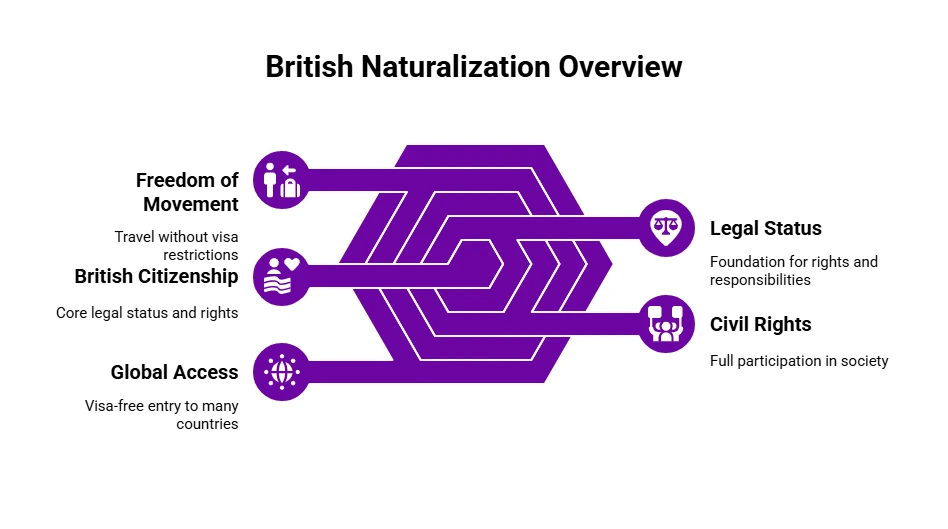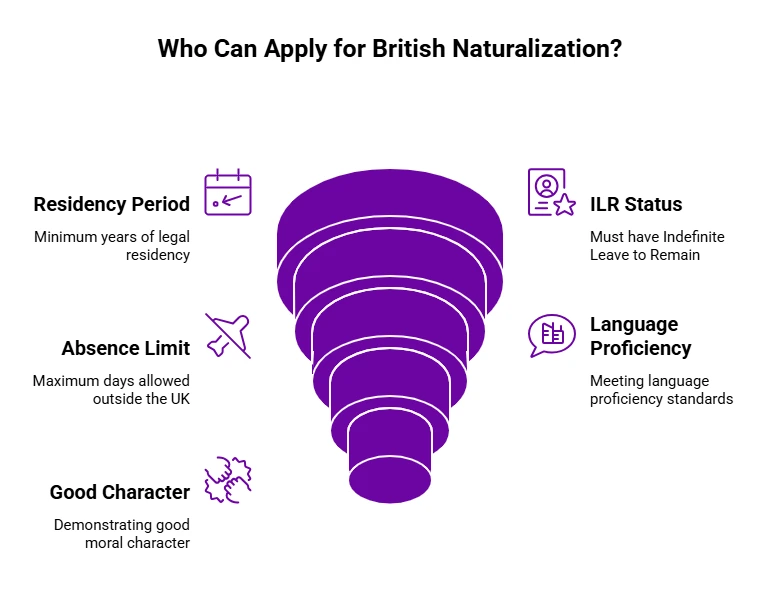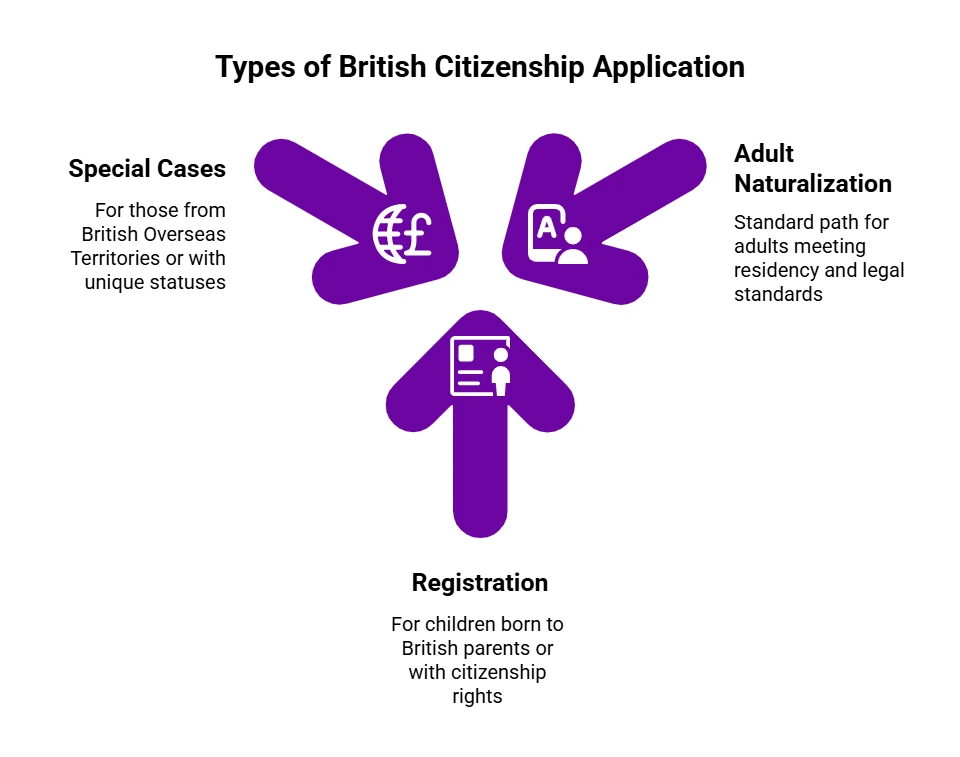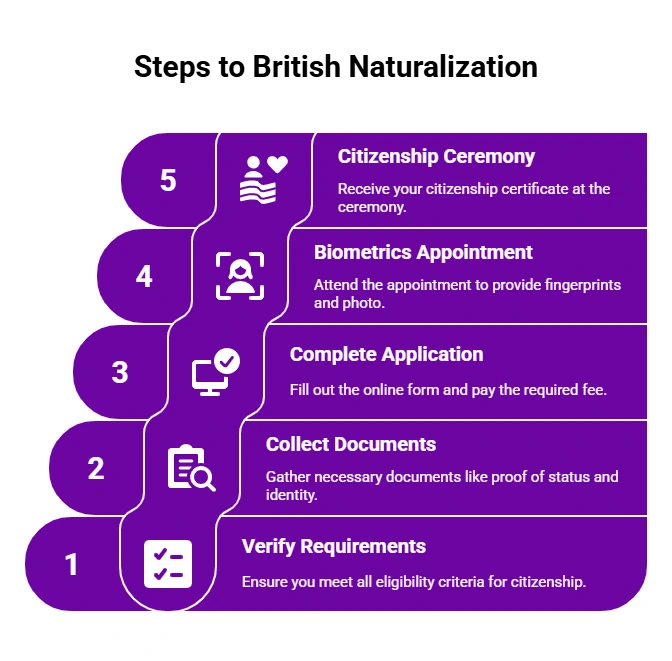British Naturalization to get a British Citizenship
British naturalization is the method through which a foreign national becomes a British citizen. It gives them legal status, all civil rights, and the chance to live, work, and travel freely with a British passport.
- In 2025, over 269,000 people got British citizenship the highest number ever recorded.
- Over 60,000 EU nationals successfully naturalized this past year.
- British citizens can enter over 185 countries without a visa or with a visa on arrival.
- Most naturalization requests are handled in 3 to 6 months.
- Citizenship grants have risen by 44% compared to last year, continuing a strong five-year increase.

What Is British Naturalization?
Becoming a British citizen through Naturalization is how a foreign national can gain citizenship after fulfilling the UK government's criteria. Usually, adults who have resided in the UK for a period and have Indefinite Leave to Remain (ILR) or Settled Status under the EU Settlement Scheme take this route. Naturalization gives individuals complete citizenship rights, such as the ability to apply for a British passport, vote in UK elections, and reside and be employed in the UK without immigration limits.
To qualify, applicants generally need to have resided in the UK for at least five years (or three years if married to a British citizen) and have had ILR or Settled Status for a minimum of one year before applying. Besides residency, they also should meet the good character demand, prove English language skills, and pass the Life in the UK Test. Naturalization is the usual path for most adult applicants, unlike registration, which applies to children and some special situations. Once granted, British citizenship is permanent.
Who Can Apply for British Naturalization?
To apply for British Naturalization, you must meet certain requirements.
You must:
- Have been a legal resident in the UK for a minimum of 5 years or 3 years if you are married to a British citizen.
- Have UK ILR or Indefinite Leave to Remain or Settled Status.
- Not have been outside the UK for more than 450 days in the past 5 years.
- Not have been outside the UK for more than 90 days in the past 12 months.
- Meet the standards for language proficiency, good character, and knowledge about life in the UK.

Benefits of Becoming a British Citizen
Gaining British citizenship offers several lasting benefits, such as:
- British citizenship eliminates the need for future visa or residency applications in the UK.
- With a British Naturalisation Certificate, you have full access to National Health Service (NHS) care and social benefits within the UK
- The ability to vote in all UK general and local elections.
- The chance to travel to many countries without a visa.
- Automatic citizenship for children born in the UK.
Types of British Citizenship Applications
British citizenship applications vary with individual situations. Adult naturalization is standard for those over 18 meeting residency and legal standards, like having Indefinite Leave to Remain. Registration is for children born to British parents or those with citizenship rights through ancestry. Special cases exist for those from British Overseas Territories, Crown service, or with statuses like British Nationals (Overseas) from Hong Kong. Each path has criteria based on age, status, family, and background.

1. Naturalization as an Adult (over 18)
For adults, becoming a British citizen usually means going through naturalization. People 18 and older can apply if they've legally lived in the UK for at least five years. They also need to have Indefinite Leave to Remain or Settled Status for at least a year before applying.
If someone is married to a British citizen, they only need to have lived in the UK for three years. Plus, they don't have to wait a year after getting Indefinite Leave to Remain or Settled Status.
Individuals applying also need to pass the Life in the UK Test, show they know English, Welsh, or Scottish Gaelic, and prove they are of good character. Doing all this means they can become a full British citizen, get a British passport, and have all the same rights as any other UK national.
2. Registration as a British Citizen (Children and Others)
British citizenship registration, primarily for children, is a legal path based on entitlement, unlike discretionary naturalization. Eligibility often stems from birth, descent, or specific criteria. Children born in the UK to non-British parents could qualify if the parents later get citizenship or settled status. Children born abroad to British citizens may also be eligible under certain situations. Some adults with ties to former British territories or those who are stateless may register. Each route needs specific documents proving UK links or British parentage. Registration is usually simpler for those under 18 to become British citizens.
3. British Overseas Territories and Other Routes
Individuals having ties to a British Overseas Territory might be able to get British citizenship if they meet specific criteria that recognize their past or legal ties to the UK. British Overseas Territories citizens (BOTCs) can apply to become British citizens, especially if they've lived in the UK for a while or have BOTC status through birth, ancestry, or naturalization. Other ways to apply exist for those who have worked for the Crown, were born to British mothers before 1983, or have older family ties that allow them to claim British nationality. Specific rules apply to groups like British Nationals from Hong Kong and those affected by nationality law changes. These applications need legal proof of eligibility based on history or family links to Britain or its past territories.
Eligibility Criteria for Naturalization Certificate
To qualify for Naturalization, applicants need to fulfil these eligibility conditions:
- Residency: Have lived in the UK for a set period (either five or three years, depending on the specific route).
- Immigration status: Hold Indefinite Leave to Remain (ILR), Settled Status, or permanent residence for a minimum of 12 months (unless married to a British citizen, in which case this requirement is immediate).
- Good character: Have no major criminal records or breaches of immigration laws.
- Language: Show good skills in English, Welsh, or Scottish Gaelic.
- Knowledge of Life in the UK: Pass the Life in the UK test.
- Future intentions: Plan to reside in the UK permanently.
Requirements and Documents Needed for Certificate
To apply, please provide the items listed:
- A valid passport or national ID.
- Proof of Indefinite Leave to Remain or Settled Status.
- Your Life in the UK Test certificate.
- An English language certificate (if needed).
- Contact information for two references (one professional, one personal) to confirm your identity.
- Your biometric info, to be taken during a scheduled visit.
- A complete record of your addresses and travel during the qualifying period.
Application Process for British Naturalization
The British Naturalization process includes the following steps:
Step 1: Verify that you meet the requirements for citizenship.
Step 2: Collect the required documents. These might include proof of your Indefinite Leave to Remain or Settled Status, proof of your identity, and test scores.
Step 3: Fill out the Form AN online and pay the fee.
Step 4: Schedule and attend your biometrics appointment to give your fingerprints and photo.
Step 5: If you British Naturalization application is approved, you will be invited to a citizenship ceremony where you will get your certificate.

Fees and Costs of British Naturalization Certificate
Detailed information about the cost to apply for British Naturalization is given below.
|
Type of Fee |
Fee |
|
Adult Naturalization Application Fee |
£1,630 |
|
Child Registration Fee (under 18) |
£1,214 |
|
Biometric Enrolment Fee |
£19.20 |
|
English Language Test (if required) |
£150–£200 (varies) |
|
Life in the UK Test |
£50 |
|
Additional Services (translation, courier) |
Varies |
|
Reapplication (if refused) |
Full fee payable again |
Processing Times of British Naturalization
Detailed information about the processing time for British Naturalization Certificate is given below.
|
Stage |
Estimated Timeframe |
|
Application Submission to Biometric Appointment |
1–2 weeks |
|
Decision by Home Office |
3–6 months (typical cases) |
|
Complex Cases or Additional Checks |
Up to 12 months |
|
Citizenship Ceremony Invitation |
Within 4 weeks of approval |
|
British Passport Application (Post-Citizenship) |
3–6 weeks |
After Gaining British Naturalization
After your application succeeds:
- You will be invited to a citizenship ceremony.
- At the ceremony, you will swear an oath of allegiance and get your certificate.
- Following that, you can apply for a British passport.
- Remember to inform places like HMRC and DVLA about your change in status.
- Any children born to you in the UK after you become a citizen will automatically be British.
What is a British Naturalisation Certificate?
A British Naturalisation Certificate is the official document issued by the UK Home Office confirming that a person has become a British citizen through naturalisation. It is granted after approval of the citizenship application and attendance at a citizenship ceremony, and is essential for passport applications, employment, and travel.
British Naturalisation Certificate for UK Applicants
-
The British Naturalisation Certificate is issued by the UK Home Office.
-
UK Naturalisation Certificate is the legal proof of British citizenship.
-
British Naturalisation Certificate issued only after attending and completing the citizenship ceremony.
Eligibility for a Naturalisation Certificate
To receive a Naturalisation Certificate, you must:
- Fulfil naturalisation requirements (such as 5 years’ lawful residence, including 1 year on ILR)
- Pass the Life in the UK Test
- Hold Indefinite Leave to Remain (ILR) or Settled Status
- Demonstrate good character and language proficiency
- Attend a UK citizenship ceremony (mandatory in most cases)
What is on the Naturalisation Certificate?
Your Naturalisation Certificate contains:
- Your full name (formatted legally)
- Date and place of birth
- Certificate number
- Nationality acquired
- Date and place of citizenship ceremony
Note: It serves as your primary evidence of British citizenship and is required for passport applications and other nationality-based benefits.
Common Issues & Corrections
- Incorrect Name Formatting: If your name is spelled incorrectly or formatted incorrectly on the certificate, you must submit a formal request for correction to UKVI. Supporting evidence (e.g., passport, birth certificate) will be required.
- Lost or Damaged Certificates: In case your certificate is lost, stolen, or damaged, you must apply for a replacement using Form NC via the official GOV.UK website. The current replacement fee is £250. Ensure your personal details match Home Office records to avoid delays.
Using Your Naturalisation Certificate
Once issued, your Naturalisation Certificate becomes your official proof of British citizenship.
Here’s how and when you can use it:
- British Passport Application: It is mandatory to present this certificate when applying for your first British passport.
- Right of Abode Certificate: You may use it to apply for a Certificate of Entitlement to the Right of Abode if needed.
- Long-Term Record: Although not needed for travel once you receive your passport, it is essential to keep the certificate safe for any future legal or immigration processes.
Step-by-Step Guide to Getting Your Naturalisation Certificate
Step 1: Meet eligibility criteria (residency, ILR, Life in the UK Test, etc.)
Step 2: Apply for naturalisation via the Home Office
Step 3: Wait for approval and invitation to a citizenship ceremony
Step 4: Attend the citizenship ceremony (unless exempt)
Step 5: Receive your Naturalisation Certificate at the ceremony
Step 6: Check all personal details for accuracy immediately
Step 7: Use the certificate to apply for a British passport or right of abode
Step 8: Apply for corrections or replacements via GOV.UK if needed
Common Reasons for Refusal
Applications can be denied if:
- The applicant hasn't lived in the UK long enough or has been outside the country for too long.
- The applicant has a criminal record or unpaid fines.
- The application is filled out wrong or is missing information.
- The applicant didn't pass the English or Life in the UK test.
- There are differences in the applicant's travel or address history.
Appeals and Reapplications
If your application is denied:
- You cannot formally appeal, but you can ask for the decision to be reviewed.
- You can submit a new application after fixing the problem that caused the denial.
- Getting advice from a professional before reapplying is a good idea, particularly if your situation is complicated.
How Can Y-Axis Help You?
Y-Axis UK gives expert help with immigration so you can confidently manage the British naturalization process without trouble. Our skilled advisors make sure your request is correct, finished, and handed in when due for the best chance of being approved.
- Individual eligibility assessment of who can apply based on your immigration background
- Full help on getting papers ready and meeting legal standards
- Guide you through the application and documentation process
- Help filling out and handing in the naturalization request (Form AN)
- Assist with form filling, document checks, and submission
- Support you in replacing or correcting your Naturalisation Certificate.
Frequently Asked Questions
